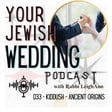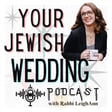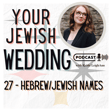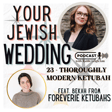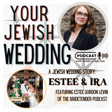
030 - Tenaim (Where Moms Break a Plate)
You know about breaking the glass, but what about breaking a PLATE?
Welcome to the first LISTENER QUESTION episode of the Your Jewish Wedding Podcast, where I answer Olivia’s question: “I was wondering if you could explain the breaking of the plates by the mothers?”
Yes! There is a Jewish custom where the mothers of the people getting married break a plate to “Seal the deal.”
(Watch a short video of a plate-breaking I facilitated here: https://drive.google.com/file/d/1p9wGz9E92s2LajZY8LAPj07MTcblOiJN/view?usp=drive_link)
As with anything to do with Jewish Weddings, there are many explanations for this custom and different ways to do it. It is connected to what was traditionally an engagement agreement called a tenaim. So, obviously, we need to learn about that first.
Show Notes are below.
Don't forget - you can reach me (Rabbi LeighAnn) any time at www.yourohiorabbi.com or everyonesfavoriterabbi.com or rabbileighann.com !
Fill out the contact form there if you'd like to work with me on your wedding. There are SO many options, from Ketubah consulting to ceremony planning. If there's something you have in mind, don't hesitate to ask - I'm here to help!
IG: @yourohiorabbi
Podcast IG: @yourjewishweddingpodcast
Send questions for me to answer on this podcast to:
yourjewishweddingpodcast@gmail.com
Hope to see you next time! Remember - there is ALWAYS more learning to do!
<3 Rabbi LeighAnn
Text of a egalitarian tenaim example:
https://docs.google.com/document/d/1a-o-c__kVCmRz2wD-NkOy12NLB324dAAs9YLGxXBOfg/edit?usp=sharing
Traditional explanations of tenaim/breaking a plate:
https://ohr.edu/ask_db/ask_main.php/2632/Q1/
https://judaism.stackexchange.com/questions/49234/why-do-the-mothers-break-the-plate
Pieces of the broken plate as auspicious:
https://ketubah.com/jewish-wedding-superstitions-segulahs/
Contemporary Tenaim/Plate Breaking Resources:
https://www.myjewishlearning.com/article/tenaim-the-conditions-of-marriage/
